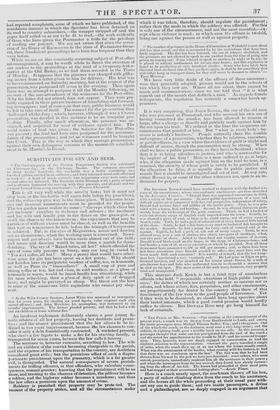"At the Wilts County Sessions, James White was sentenced to
transporta- tion for seven years, for stealing six wood fagots, value sixpence each (his second offence); and John Hawkins, his accomplice, was sentenced to six months' imprisonment. The former pleaded poverty, and that he had a wife and .six children at home without fire."
An insolvent tradesman deliberately cheats a poor young fe- male relative of all her property, leaving her destitute and penni- less ; and the utmost punishment that the law allows to be in- flicted is two years' imprisonment, because the law chooses to con- sider it only a debt fraudulently contracted. A wretched peasant, who steals a few fagots to make a fire for his starving family, is transported for seven years, because the law calls it larceny.
The sentence is, however excessive, according to law. The wife and six children of the convict becoming chargeable to the parish, and the expense of his transportation to the country, are doubtless considered great evils; but the pernicious effect of such a dispro- portionate punishment upon the peasantry, which is a far greater evil, is disregarded. The natural consequence of severe punish- ments for trilling offences, is that offenders, who calculate conse- quences, commit greater; knowing that the punishment will be no more, and trusting to the chances of detection, the pilferer becomes a robber, and the highway robber becomes a murderer; and thus the law offers a premium upon the amount of crime.
Robbery is punished that property may be prote:ted. The amount of the property stolen, and all the circumstances under • which it was taken, therefore, should regulate the punishment ; rather than the mode in which the robbery was effected. For this is only one of the circumstances, and not the most essential,—ex- cept where violence is used ; in which case the offence is twofold, being one against the person as well as against property.






















 Previous page
Previous page